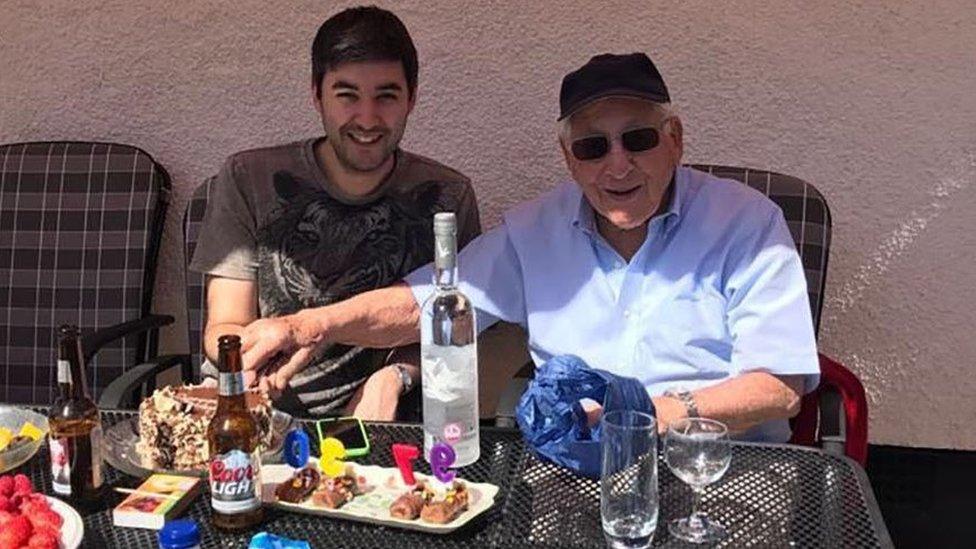Coronavirus: Your lockdown stories revisited
- Published
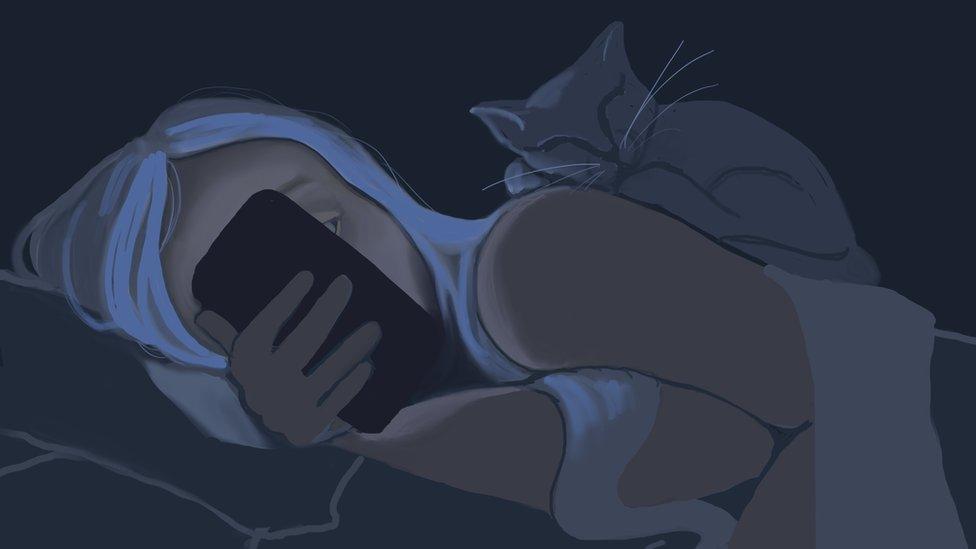
Artist Angie Lafrance (@ramblerow) told us of her struggle with being alone during lockdown
Bit by bit, countries are starting to emerge out of lockdown, some more quickly than others.
When the world began to shut down to try and control coronavirus, we interviewed many of you to see how you were coping. Now, we've gone back to ask: how did you change during lockdown, and what did you learn?
'I learned the hard way'
Musician Laurie Wright, of Cheltenham, had been in recovery for alcohol and drug addiction for four months when lockdown started.
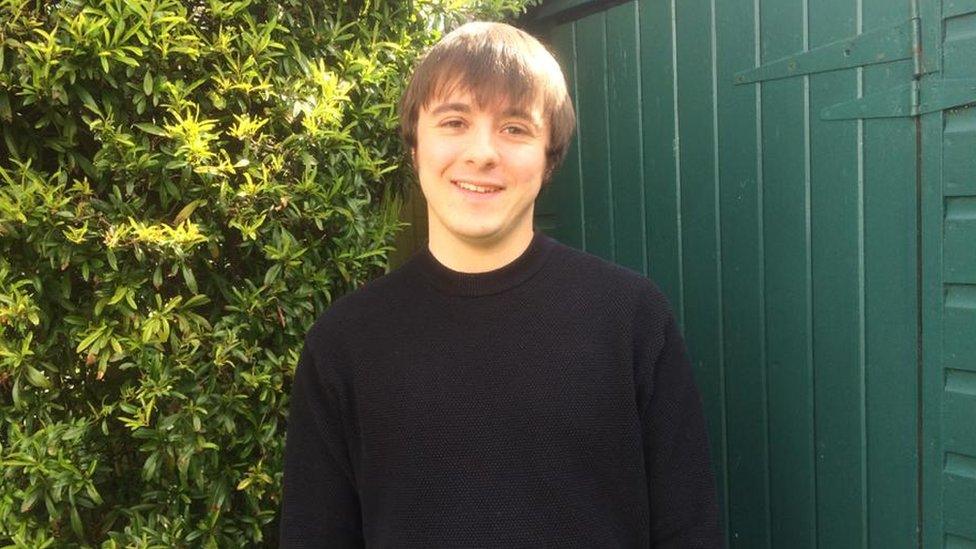
Lockdown on the whole was OK. I was with my parents for the whole thing and we get along very well, so I was lucky compared to many who were completely isolated. I raised £1,750 for the NHS by live streaming every night and selling my music and merch. I didn't pick up a drink or drug and managed to accept that Narcotics Anonymous meetings are now on Zoom, and we're blessed to have that forum at all.
My recovery took a bash in early lockdown as I replaced my recovery with chats I was having with a girl. The nature of addiction being a bigger picture than drugs, this didn't go well, but it's OK now. There's a recovery phrase 'whatever you put in front of your recovery, you will lose,' and I learned the hard way on that and won't be putting anything in front of my recovery again. Recovery comes first, and the rest falls into place.
I learned how to cook even more, wrote 14 songs and found I, like most people, enjoy walking. I learned that you don't need to be in London or even out of the house any more to build a fan base, which was cool but slightly scary that the world has turned this way.
I'm looking forward to touring the UK and eventually Europe as soon as it is permitted to do so.
'I had so many people reach out to me'
Like millions of other Americans, artist Angie Lafrance, of Maine, lost her job as coronavirus spread. She spoke to the BBC in April about how she was struggling with isolating alone.
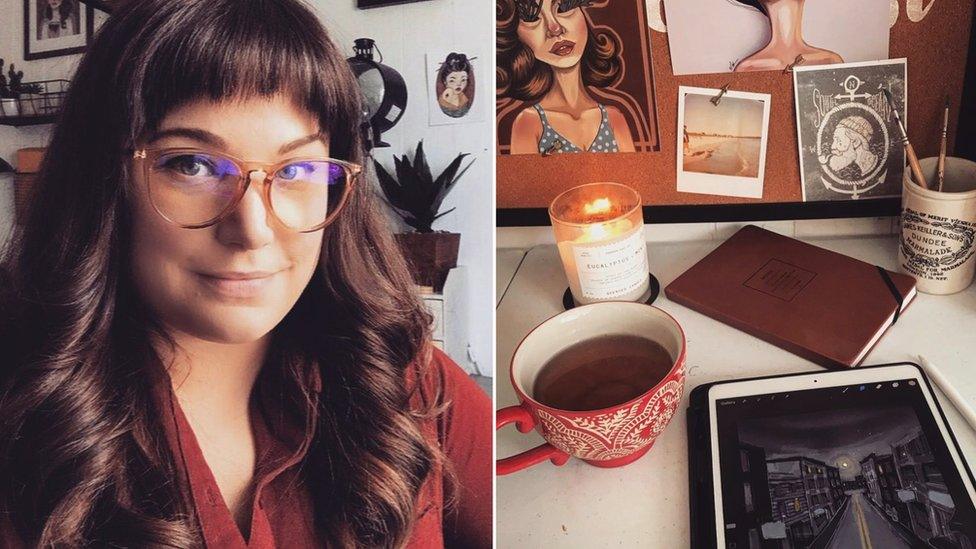
There are a lot of emotions tied to this new way of life and I can always channel them through my art. After the article was published, I had so many people from all over the world who had connected with the illustrations reaching out to me and sharing their own experiences - that in itself has made me feel less isolated.
I definitely still feel the weight of uncertainty when it comes to thinking about the future. Where I live, things are slowly starting to open back up in phases but of course, it's far from business as usual.
Not too much has changed as far as my day-to-day life: I'm still mostly isolated, I follow social distancing practices and I wear a mask. I think regardless of the lockdown becoming less stringent, I still feel a personal responsibility to keep others safe.
We can't control our current administration's response, but we can hold ourselves personally accountable for our own active role in slowing the spread. I have friends who have lost family members to the virus and I worry all the time about my own loved ones.
If I could go back in time and give myself any advice, I guess it would probably have to be to focus on the things I can control. Losing my job being separated from my friends and family, and the constant battle between who is and isn't taking it seriously enough are not things that I can control or that I was prepared for.
All I can do is take each day as it comes and try to stay healthy and as positive and hopeful as I can.
'No-one wants to cry together at a two-metre distance'
Dr Nick Schindler's grandfather John Cohen died aged 99 while under lockdown - Nick spoke to us in early April.
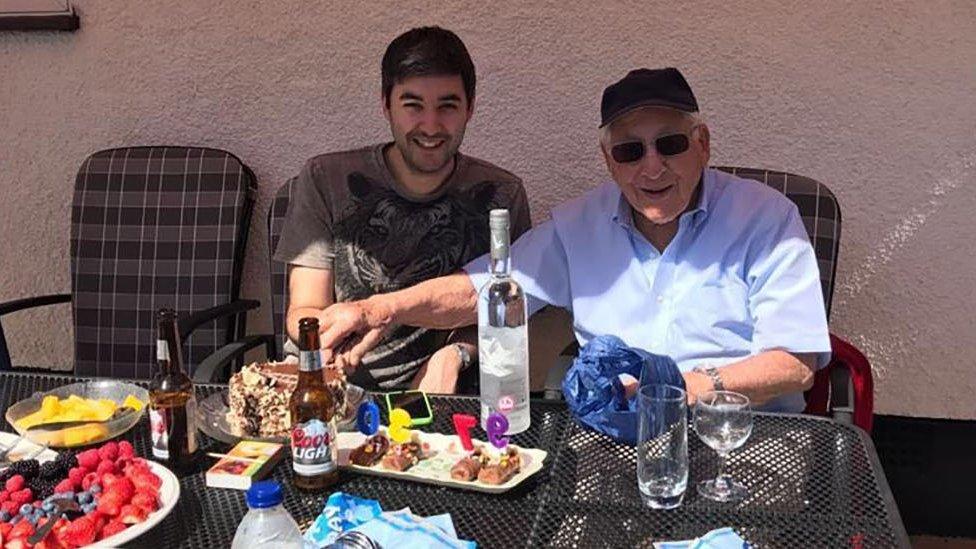
Dr Nick Schindler with his grandfather John Cohen
I'm not sure if we have started to grieve for Grandpa yet, it still doesn't quite seem real, and no amount of video chats on Zoom or WhatsApp seems to change that.
We talk about him, we make jokes and remember him most times we speak, but it's not the same. Even a brief government-sanctioned meet-up in my parent's garden doesn't quite allow for catharsis. No one wants to cry together at a two-metre distance, and we don't dare risk giving in to even the briefest of hugs. So we have kept quiet and carried on, which is what he would have done.
My parents were allowed to retrieve his things from the residential home in the last week, with meticulous precautions. It is strange to see his prize possessions in new places. He always enjoyed trying to give everything he could away to us, organising and wrestling control from fate. We always declined of course. Now he won't take no for an answer, and so his carefully curated world is divided amongst our chaotic ones.
Things are a poor substitute for family, and I look forward to us being safely together again soon, and the hugs.
'I'm stuck in some kind of limbo'
Naomi, 21, is a final-year psychology student from Cardiff. She told us her anxiety increased hugely because of coronavirus.
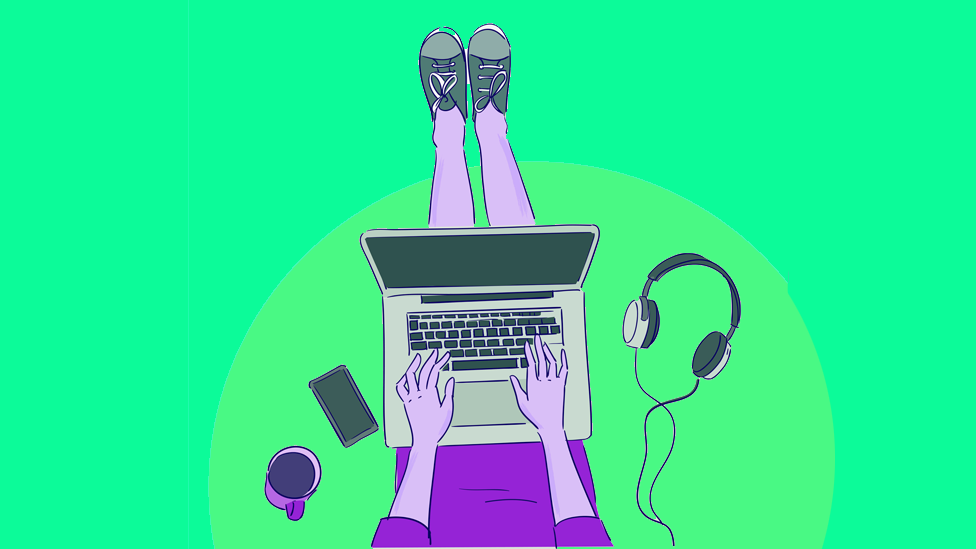
My finals ended last week, possibly the most stressful few weeks of my life. It was really draining. We can't mark the end of uni, so I'm stuck in some kind of limbo where I feel like I haven't finished. It's a very weird place to be.
I was really anxious going into lockdown, but then I got quite settled. Now that measures have started being eased, that's spiked my anxiety again. There's so much change happening. As we're being allowed to go and meet up with people, socially distanced, I actually feel more lonely.
I've always struggled with loneliness and feelings of isolation, largely because my friends are very spread out. Lockdown was almost a comfortable place for me. I've always communicated with my friends on video calling or messaging, and when everybody was doing it didn't feel quite as lonely. But now, as we're going back to normal, those feelings are surfacing again.
I don't have many friends in Cardiff, whereas my housemate does, so she's not around as much. And the people I was talking to across the country, they're now busier. I haven't seen my family all year, but I start a new job next month, so my mum and my brother are coming down to help me move house. I think there's a lot of exciting things to come.
'It will take a lot of changes to lose that fear'
Angela Steatham, from Llanrhaeadr-ym-Mochnant in Wales, has chronic lymphocytic leukaemia and is deemed clinically extremely vulnerable to the virus, meaning she was one of 2.5 million people in the UK advised not to leave their homes at all.
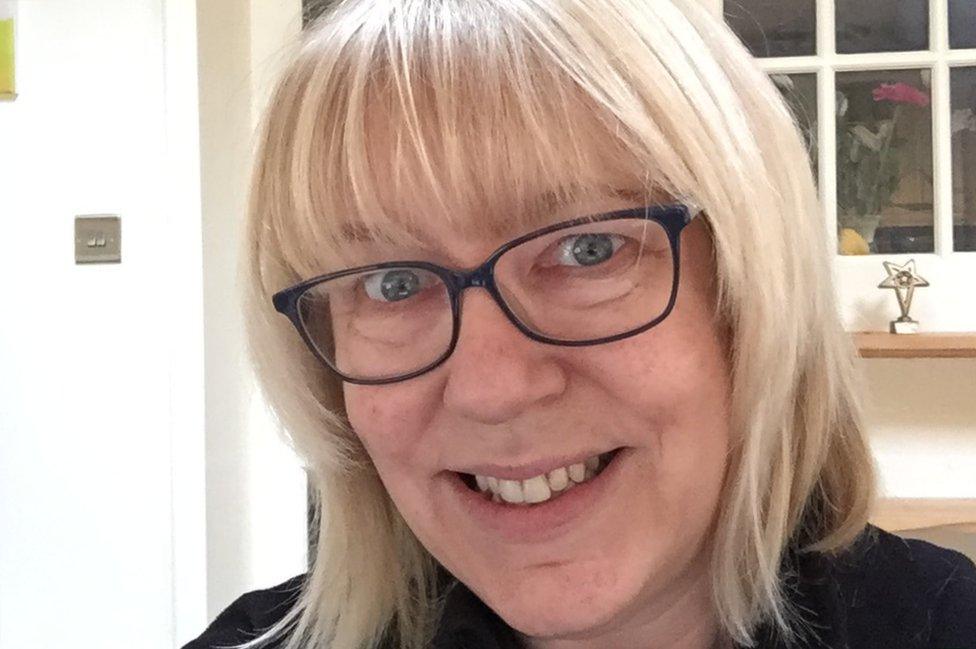
It was business as usual one day, and then suddenly, everything changed - for everybody in the world. At the beginning because it was such an enormous shock, I was very willing to put my trust in the government. But as we've seen how they've handled it throughout, I'm now at the stage where I don't trust they are making the best decisions for everybody.
I've lost a lot of my independence. I've always been a fiercely independent woman. For the first time, I've had to accept being looked after by others. I've been labelled extremely vulnerable - I've never been a vulnerable person in my whole life!
What's really weird - I think it's a bit like Stockholm syndrome - is I'm sort of used to being inside. I've travelled to war-torn countries. I was in Kathmandu on 9/11, I had to be flown out with the Dalai Lama on a military jet. I've never been afraid. But just driving to the hospital on Monday was really quite scary.
Because they told us we were classed as clinically extremely vulnerable, it gives you that sense of fear. It's going to take a long time and a lot of changes for that fear to be reversed.
Interviews by George Wright, Kelly-Leigh Cooper, Alice Evans, Vibeke Venema and Joseph Lee
- Published14 April 2020
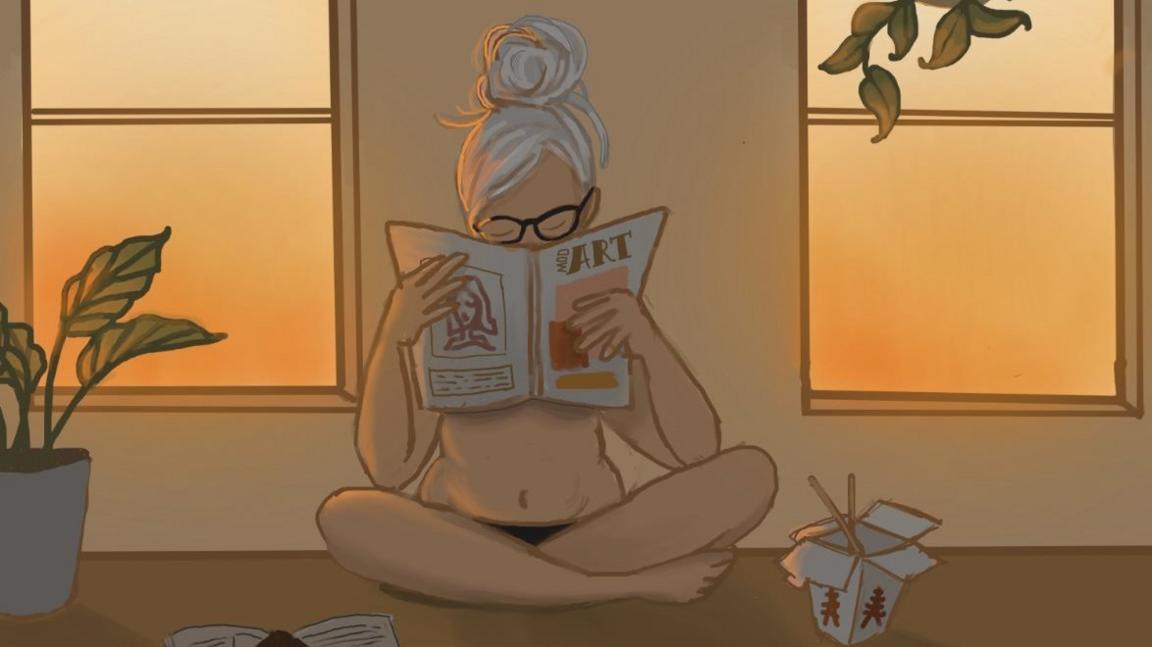
- Published1 April 2020
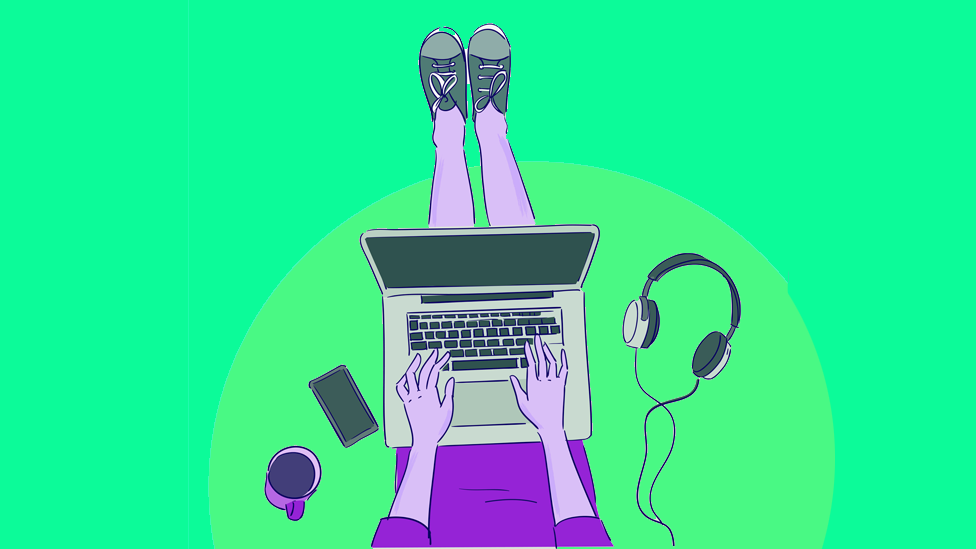
- Published4 April 2020
